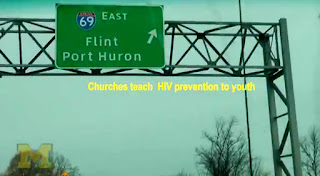ANN ARBOR, Mich.—When 10th-grader Quintin Scott learned that only physicians could diagnose AIDS, he wasn't in sex education class and he wasn't overhearing locker room talk: Scott was in church.
Such open discussion about sexual health in the African-American church where Scott learned this information would have been unthinkable even a few years ago, but at the time Scott was taking a test to become a peer counselor in one of the 55 churches in Flint, Mich., that participate in YOUR Blessed Health, a youth program now in its fifth year.
The primary goal of YOUR Blessed Health is to provide African-American faith leaders with the knowledge and communication tools to educate young members about HIV and sexually transmitted infections.
Derek Griffith, assistant professor at the University of Michigan School of Public Health, is evaluating the effectiveness of YOUR Blessed Health.
"In a project like this, 'evaluator' translates to helping with the development of the program, as well," he said. "In a broader sense, we're trying to bring some science to the work that is being done. The question is how do you build the science around it to help strengthen the impact of the program on youth, on the organization and on the community?"
Sex and HIV are, historically, taboo topics in African-American churches, despite the fact that AIDS impacts African Americans in disproportionately higher numbers than other minority groups and whites—which is exactly why African-American churches in Flint so desperately needed YOUR Blessed Health, said Bettina Campbell, executive director of YOUR Center and principal investigator who started the pilot program in 2006.
In six years, 55 churches representing nine denominations in Flint have joined YOUR Blessed Health.
To that end, one critical component of YOUR Blessed Health is enlisting the pastors' spouses and teaching them the training.
"Church is not just for the people right inside, it's for the whole community," Jefferson said.
YOUR Blessed Health intervention includes a menu of activities for faith leaders to select from according to their institutional beliefs, doctrines and culture. For instance, the pastor who frowns on a counselor demonstrating proper condom application on a banana on church grounds, might allow that same demonstration in, say, an empty office space next door to the church.
U-M's Griffith said he and Campbell have been approached by churches around the country who are interested in duplicating the program, and that the goal is to use YOUR Blessed Health as a model for how to educate people about sexual health in faith-based settings and the African- American community.
The University of Michigan School of Public Health has been promoting health and preventing disease since 1941, and is ranked among the top five public health schools in the nation. Whether making new discoveries in the lab or researching and educating in the field, SPH faculty, students and alumni are deployed around the globe to promote and protect our health.
Contact: Laura Bailey Phone: (734) 647-1848













No comments:
Post a Comment